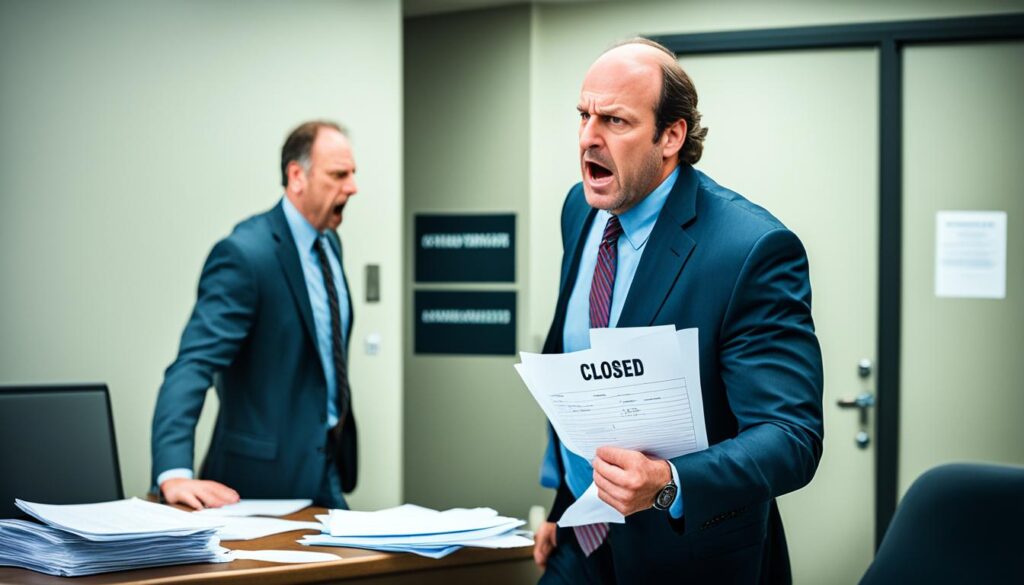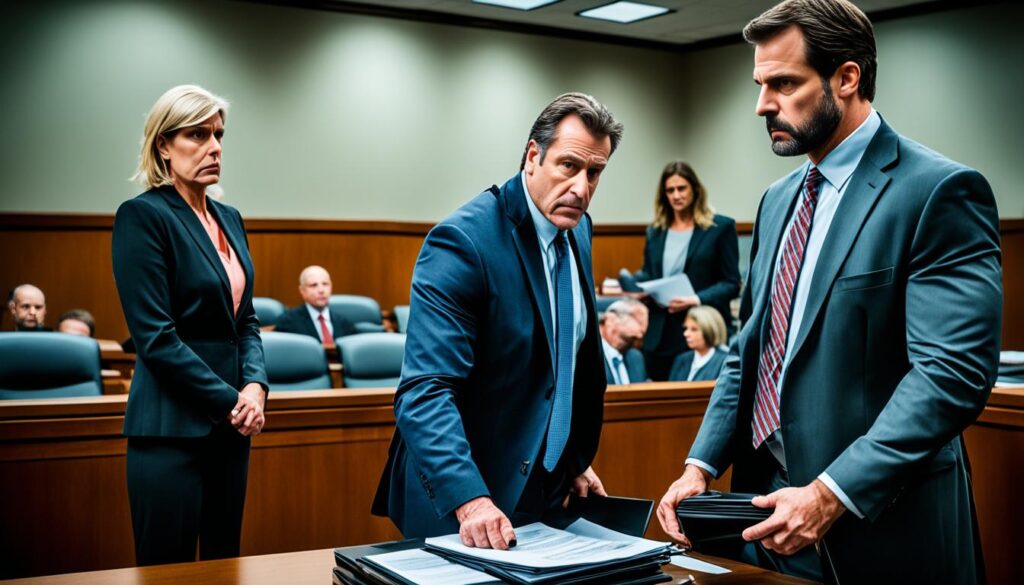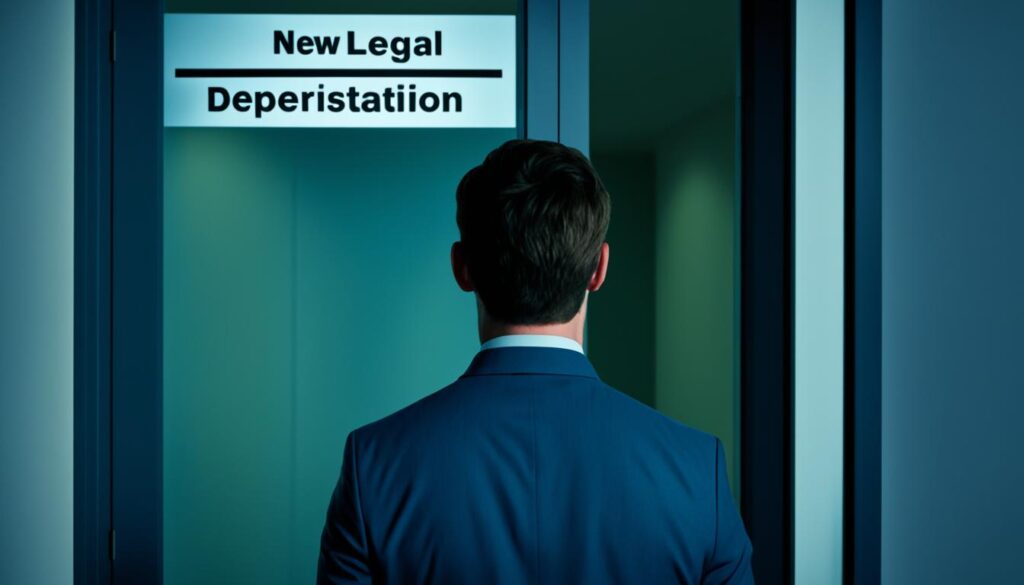Attorneys might want to stop representing a client for various reasons. This could be due to disagreements over fees, issues with conflicting interests, not being able to talk well with the client, concerns about ethics, or because they can’t keep representing them. When an attorney wishes to stop representing a client, they file a formal motion to withdraw. This is the legal way to ask the court’s permission to break their working relationship with a client.
The process of withdrawing involves telling the client and then filing a motion in court. The attorney might also have to go to a hearing. At the hearing, a judge will decide if the withdrawal is allowed. Deciding isn’t always easy because the court needs to consider why the attorney wants to leave and the client’s right to have a lawyer continue representing them.
Key Takeaways
- Attorneys may file a motion to withdraw from a case for various reasons, including fee disputes, conflicts of interest, client communication issues, ethical concerns, or the attorney’s inability to continue representation.
- The withdrawal process involves notifying the client, filing a motion with the court, and potentially appearing at a hearing where the judge decides whether to grant the withdrawal.
- Attorneys are not afforded the privilege to fire or drop a client, whereas clients have the luxury of firing their attorney at any time for any reason.
- Judges sometimes refuse attorney withdrawals, especially as cases approach trial, as they aim to protect the client’s right to continued representation.
- Clients charged with a crime in Arizona can seek legal help from the criminal defense team at JacksonWhite by calling (480) 467-4370 for a confidential consultation.
Understanding Attorney Withdrawal Motions
Attorney withdrawal is when a lawyer ends their work with a client. This process can be hard and influence the client’s case. Everyone involved should know why attorneys sometimes leave. It’s important for dealing with this situation well.
What Does Attorney Withdrawal Mean?
Attorney withdrawal means the lawyer stops helping a client in their legal issue. This choice could be due to money disagreements, having a conflict in cases, or if the client isn’t working together. When withdrawing, the lawyer has to follow clear steps. These help make sure the client is okay.
Why Do Clients Feel Upset When an Attorney Withdraws?
When their attorney quits working on their case, clients can feel upset. It’s a big deal that causes stress. They might fear how their case looks to the judge. They also stress about getting a new attorney and starting over.
Moreover, they might think their lawyer is leaving them at a bad time. This moment in the case could be really important for the client.
“Clients often feel upset or abandoned when their attorney withdraws, as it can be a stressful and disruptive experience.”
Attorneys need to handle this situation carefully to reduce these worries. They should talk clearly with their client, give them enough time, and help them get their documents. By putting the client first during this change, attorneys make the process smoother for everyone.
Common Reasons for Attorney Withdrawal

Attorneys sometimes withdraw from cases due to a conflict with the client about money. Legal firms have many costs like paying staff and office rent. So, when clients can’t pay, it’s tough for the attorney to keep working on the case.
A different reason for withdrawal is a conflict of interest. This happens when the attorney’s personal or professional ties stop them from fully helping the client. It might make the attorney have mixed feelings or not be able to give clear advice.
| Reason for Attorney Withdrawal | Percentage of Cases |
|---|---|
| Fee Disputes and Money Conflicts | 45% |
| Conflicts of Interest | 32% |
| Client Non-Cooperation | 12% |
| Other Reasons (e.g., attorney illness, safety threats, rude client behavior) | 11% |
Studies show that money fights and conflict of interest are the main reasons attorneys quit cases. These issues make up most cases where attorneys withdraw. Other problems include clients not working together or outsiders causing trouble.
Good communication, paying your bills quickly, and showing respect to your attorney can avoid withdrawal. Knowing why attorneys leave can help keep your relationship strong. This can lead to a better outcome for everyone involved.
Other Reasons for Attorney Withdrawal
Attorneys can step back from a case for more reasons than just money fights or problems with the client. They might quit if they fall sick or feel threatened. If the client treats the staff badly, the case gets too tough, or someone else messes things up, they might leave. Non-responsiveness from the client, a loss of trust, issues within the attorney’s firm, or if the client wants to do something illegal or unethical can also lead to withdrawal.
In Texas, attorneys can stop representing a client for certain reasons. For example, if the client keeps doing something potentially illegal, sets goals the attorney disagrees with, or doesn’t pay their bills. Rule 10 of the Texas Rules of Civil Procedure lays out what an attorney has to do to withdraw during an active case. They need to explain why they’re leaving, if someone else will take over, and if the client wants them to leave.
There are times when attorneys can’t quit, though. Like when a judge says they can’t leave, even if the client fires them. This often happens in criminal cases with court-appointed lawyers. The rules about when and how a lawyer can withdraw vary from place to place. Some places require a court’s permission, others don’t as long as they follow certain rules.
When an attorney leaves a case, they must formally tell the client. They should explain that they’re stopping work, say what will happen with any documents, and lay out any money the client still owes. This helps keep a good relationship between attorney and client, even after parting ways. The law guides this process to protect everyone’s rights.
Why Would an Attorney File a Motion to Withdraw?

Attorneys need the court’s permission to leave a case. They have to file a motion to withdraw. To pull out, they must show a good reason. This reason might include what was already talked about before.
Several things might lead an attorney to stop representing a client. These include:
- Fee Disputes and Money Conflicts: Disagreements over fees or unpaid bills can lead to an attorney wanting to leave.
- Conflicts of Interest: If the attorney finds a situation where they can’t fully support the client, they might have to withdraw.
- Breakdown in the Attorney-Client Relationship: When the relation between the attorney and client has gone bad, they might want to pull out.
- Client Misconduct: If a client does something wrong or illegal, it could force the attorney to leave.
If the trial is close, the court might not let the attorney leave. Also, the court might say no if they think the reason for leaving is not good enough.
The court does often let attorneys leave cases. But if the correct steps are not followed, they might say no. The attorney must file the withdrawal motion correctly for it to be approved.
When an attorney wants to leave, clients may worry. They might wonder if they need a new attorney or have to represent themselves. But the attorney should tell the client about any upcoming important dates or events in the case before they leave.
Can an Attorney Withdraw Mid-Proceedings?
Attorneys might try to leave a case before it ends. This could happen, for example, if sticking with the case could harm or slow things down for all parties. They need strong reasons to quit at a late stage, like near a trial date.
When attorneys want to leave, they have to write a letter to the judge. This is in cases that are still in court. The judge can say it’s okay to quit if the client doesn’t mind after being told for 10 days or if the client agrees. The lawyer also has to let the client know about the effects of them leaving.
Sometimes, an attorney has to quit, like if they’re not good enough to keep going or if they have a conflict of interest. They might also quit if they don’t get along with the client or if they’re not paid. The lawyer should leave in good terms, returning all the client’s things and helping out the new lawyer.
But, leaving abruptly isn’t always allowed. If the reasons for leaving are unclear or if it’s bad for the client, the court might not let the attorney go. Attorneys who do leave must give back everything that belongs to the client, keep things secret, and help the client find a new lawyer.
An attorney breaking the rules while leaving could get in trouble. This might even lead to them losing their license to practice law. It’s crucial for everyone to know what to do when an attorney wants to quit before a case ends.
The Process of Attorney Withdrawal

Withdrawing as an attorney involves many vital steps for a smooth client transition. Attorneys need to carefully step through a specific process. They do this to safeguard the client’s interests and meet legal guidelines.
Notifying the Client
The first phase of attorney withdrawal is telling the client. They must share their intention and reasons in written form. This gives the client time to find new legal help.
Filing a Motion to Withdraw
Next, the attorney files a motion to withdraw with the court. This explains why they can no longer represent the client. The court then must approve this request. Any motion filed should not include private client details nor say anything bad about the client.
Court Hearings and Rulings
The court responds by either granting the withdrawal or calling a hearing. If there is a hearing, the attorney and client get to discuss why the withdrawal should happen. The court’s main concern is always the client’s wellbeing.
If the withdrawal gets approved, the attorney works to protect the client. This means giving over important case papers, returning any unused fees, and helping the client find new representation.
Withdrawal is a detailed, important process for attorneys. It shows the upmost care to clients and keeps the legal system ethical. By carefully proceeding and putting the client first, attorneys make sure changing legal representation goes well. They also keep the profession honorable.
What to Do When Your Attorney Withdraws
When your attorney wants to leave your case, it’s a tough spot. But, it’s key to know your choices to keep your rights safe.
Consider Your Options
Try to understand why your attorney wants to back out. Maybe there’s a money issue or a conflict that triggered this move. You could work to solve it and ask them to stay on. Sometimes, you could both agree to overlook a conflict and keep working together.
If it’s just not working out and they’re out, you might have to accept that. Go over why they’re quitting. If you find it unfair or it hurts your case, you could fight their decision.
Determine Your Next Steps
Once you’ve weighed your options, move on to what’s next. If they’re really leaving, you need to find someone new. This is especially critical if you have legal trouble and need a good attorney on your side.
Look for a new lawyer who’s skilled and easy to talk to. Think about how they charge, how they work, and how they share information. You want someone who’s the right fit for you and skilled in your kind of case.
If you’re up against a deadline or about to go to trial, act fast. Find new legal help soon to keep things moving and to protect your case.
“Preventing lawyer withdrawal can be achieved by paying bills on time, communicating during financial challenges, cooperating with the legal team, avoiding interference in the case, being truthful and forthcoming, respecting the legal system, and maintaining respectful communication with the lawyer.”
It’s hard when your attorney quits, but stay proactive. Think through your options and steps. This way, you can make sure your legal needs are still met well.
Finding New Legal Representation

If your attorney stops representing you, it’s vital to act quickly to find new legal help. It might seem tough, but finding a new lawyer who fits your case well is possible. You can get the expertise and support needed to keep your case moving forward strong.
When looking for a new lawyer, their experience is key. Focus on finding a criminal defense attorney with a strong history in cases like yours. They’ll know the laws, the processes, and the courts, which is very helpful for your case.
How available and how well an attorney communicates are also important. Pick a lawyer who can give enough time and care to your case. They should also keep you up-to-date and involve you in the legal process.
Also, the cost to hire the lawyer matters. Be open about what you can afford. Look for payment options that work for you, like payment plans or contingency fees. Stay away from lawyers who put more focus on their pay than on helping you.
- Look for an experienced criminal defense attorney with a good track record.
- Make sure the lawyer can meet your availability and communication needs.
- Think about the fee structure and choose what fits your financial situation.
With careful research, choosing new legal representation can help boost your case’s confidence. This could increase your likelihood of a good outcome.
“The right attorney can make all the difference in the outcome of your case. Take the time to find the one that best fits your needs and circumstances.”
Conclusion
Whether an attorney should leave a case is a tough choice with big impacts. Reasons might include money disagreements, conflicts with the case, trouble talking with the client, ethical issues, or not being able to help anymore.
When an attorney wants to leave, they must tell the client and request the court’s permission. Then, they might have to go to a hearing. At this hearing, the judge decides if they can really quit the case.
If your attorney does leave, it’s very important to figure out what to do next. This step is even more crucial in criminal cases where having a good lawyer is vital. You should get new legal help quickly.
Knowing why and how attorneys might leave a case helps you be ready for such a tough situation. It’s about looking after your rights as the client. Good communication, acting fast, and sticking to high morals are essential for handling this properly when your attorney wants to drop your case.
